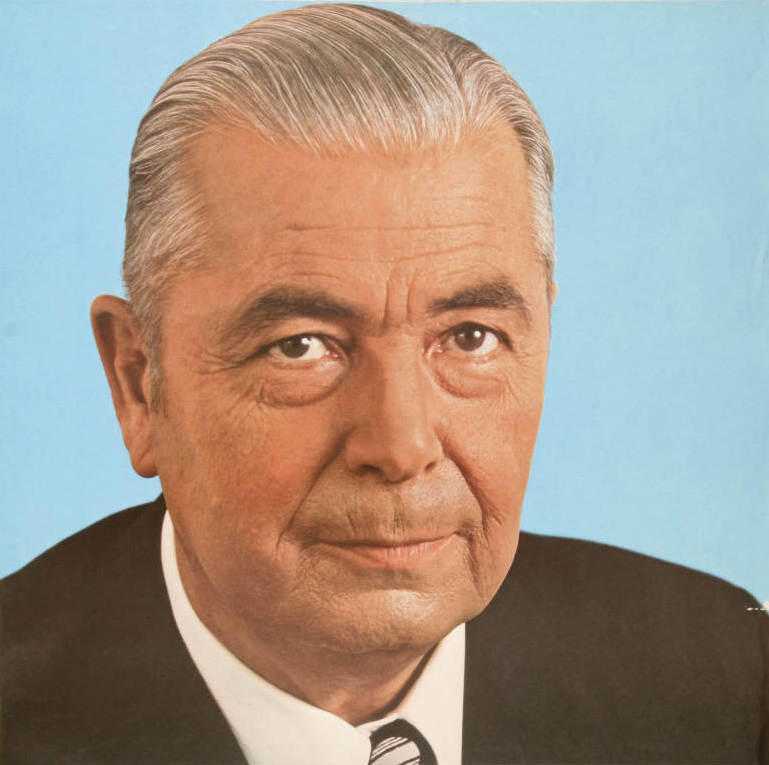Franz-Josef Röder on:
[Wikipedia]
[Google]
[Amazon]
 Franz-Josef Röder (22 July 1909 in
Franz-Josef Röder (22 July 1909 in
Saarland biography
(in German) {{DEFAULTSORT:Roder, Franz-Josef 1909 births 1979 deaths Presidents of the German Bundesrat Christian Democratic Union of Germany politicians Members of the Landtag of Saarland Nazi Party members People from Merzig-Wadern People from the Rhine Province Ministers-President of Saarland Sturmabteilung personnel Hitler Youth members
 Franz-Josef Röder (22 July 1909 in
Franz-Josef Röder (22 July 1909 in Merzig
Merzig (, french: Mercy, ''Moselle Franconian:'' ''Meerzisch''/''Miërzësch'') is a town in Saarland, Germany. It is the capital of the district Merzig-Wadern, with about 30,000 inhabitants in 17 municipalities on 108 km². It is situated ...
– 26 June 1979 in Saarbrücken) was a German politician of the CDU and from 1959 to 1979 Minister President
A minister-president or minister president is the head of government in a number of European countries or subnational governments with a parliamentary or semi-presidential system of government where they preside over the council of ministers. I ...
of Saarland
The Saarland (, ; french: Sarre ) is a state of Germany in the south west of the country. With an area of and population of 990,509 in 2018, it is the smallest German state in area apart from the city-states of Berlin, Bremen, and Hamburg, and ...
. He had been a member of the Nazi Party
The Nazi Party, officially the National Socialist German Workers' Party (german: Nationalsozialistische Deutsche Arbeiterpartei or NSDAP), was a far-right political party in Germany active between 1920 and 1945 that created and supported t ...
from 1933 to 1945.
Affiliation to various branches of the Nazi Party
Röder was closely associated with the seven branches of theNSDAP
The Nazi Party, officially the National Socialist German Workers' Party (german: Nationalsozialistische Deutsche Arbeiterpartei or NSDAP), was a far-right political party in Germany active between 1920 and 1945 that created and supported t ...
(Nazionalsozialistisches Deutsche Arbeiter Partei), the NSKK (Nazionalsozialistiches Kraftfahrcorps), the NS (Nazionalsozialisticher Lehrerbund), DF (Deutsche Front), Ordnungsdienst (Nazi street-fighter unit under SS leadership), and the SA (Sturmabteilung, forbidden at that time by the League of Nations). According to his father, he also held an unspecified leadership function with the Hitler Youth
The Hitler Youth (german: Hitlerjugend , often abbreviated as HJ, ) was the youth organisation of the Nazi Party in Germany. Its origins date back to 1922 and it received the name ("Hitler Youth, League of German Worker Youth") in July 1926. ...
. He became a member of these militant organizations in 1933 and 1934, prior to the official Nazi takeover of the Saar region of Germany in 1935, when the Saarlanders made their decision to join with Hitler's terror regime, a decision in which Röder played an important part by luring his fellow Saarlanders to neglect any reticence against the abolition of human rights. As such, his militancy in these groups was a personal choice rather than an acquiescence to political pressure. This is further evident in an archived letter from his father dating to 1937, which described his personal and family merits in promoting Nazionalsozialismus in the Saar region. Further, there is a notice on Röder's NSDAP membership card showing his transfer from his hometown Neunkirchen NSDAP to The Hague
The Hague ( ; nl, Den Haag or ) is a city and municipality of the Netherlands, situated on the west coast facing the North Sea. The Hague is the country's administrative centre and its seat of government, and while the official capital o ...
underground branch of the NSDAP, which was illegal under international law at the time. When Röder died in 1979, the Dutch ambassador in Bonn
The federal city of Bonn ( lat, Bonna) is a city on the banks of the Rhine in the German state of North Rhine-Westphalia, with a population of over 300,000. About south-southeast of Cologne, Bonn is in the southernmost part of the Rhine-Ru ...
, Baron Diederic van Lynden, wrote an official letter of condolenceErich Voltmer, Franz-Joseph Röder: Ein Leben fuer die Saar, Dillingen, 1979. which excluded the period of time between 1940 and 1944, during which Röder was working as an occupation official under the orders of convicted war criminal (at the Nuremberg trials
The Nuremberg trials were held by the Allies against representatives of the defeated Nazi Germany, for plotting and carrying out invasions of other countries, and other crimes, in World War II.
Between 1939 and 1945, Nazi Germany invaded m ...
) Arthur Seyss-Inquart
Arthur Seyss-Inquart (German: Seyß-Inquart, ; 22 July 1892 16 October 1946) was an Austrian Nazi politician who served as Chancellor of Austria in 1938 for two days before the ''Anschluss''. His positions in Nazi Germany included "deputy govern ...
, demonstrating that Röder then was a well known negative element in the Dutch-German relations. Still, in 1944, he was decorated by Nazi authorities with the ''Kriegsverdienstkreuz ohne Schwerter'' for "special merits", an "honour" which he never explained. In his denazification procedures, he was found in the first instance to be guilty, then in a later general amnesty reduced to "less guilty". During his years in power after 1955, he largely favoured the return of old NSDAP members in all government cultural and political functions of all levels and made sure that none of the group of the former opponents to Hitler could ever take an influential office again.
References
External links
Saarland biography
(in German) {{DEFAULTSORT:Roder, Franz-Josef 1909 births 1979 deaths Presidents of the German Bundesrat Christian Democratic Union of Germany politicians Members of the Landtag of Saarland Nazi Party members People from Merzig-Wadern People from the Rhine Province Ministers-President of Saarland Sturmabteilung personnel Hitler Youth members